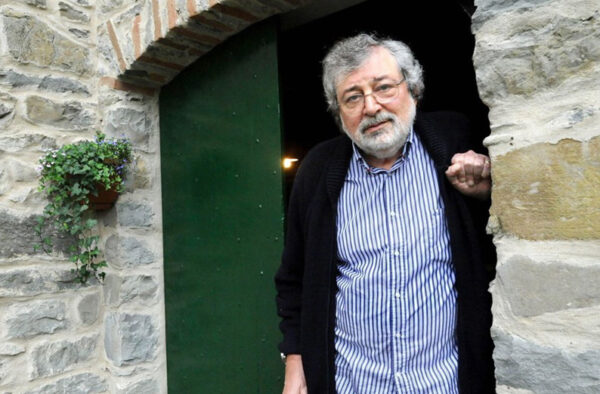We celebrated on Facebook live video the 80th birthday of Francesco Guccini, the beloved Italian singer-songwriter (cantautore) and author, born June 14, 1940 in Modena, my hometown. The host was Beppe Cottafavi. He was the editor of the 1990s cult magazine COMIX, when he asked me to write for them my Hollywood interviews with comedy idols like Dan Aykroyd and Robin Williams. Invited to participate in the erudite conversation sponsored by the city of Modena were writer Antonio Franchini, from Naples, Alberto Bertoni, professor of Italian Literature at the University of Bologna, and singer Luciano Ligabue from Correggio.

Guccini joined us from the mountain village of Pavana (Tuscany), where he now resides permanently, after living there during World War II as a child, when his paternal grandparents owned a mill, and spending summers there after his family returned to Modena in 1945 before moving to Bologna in 1961.
Impressions were exchanged about favorite songs by Guccini: La locomotiva, Incontro, L’avvelenata, Cirano, 100 Pennsylvania Avenue. (Click on the song’s titles in red to see a young Guccini sing them). Some of his numerous books were mentioned: Croniche epafaniche (1989), Vacca d’un cane (1993), Cittanova Blues (2003), Tralummescuro (2019), and the June 2020 revised edition of his 2010 autobiography, Non so che viso avesse, with an analysis of his songs written by Alberto Bertoni, who places Guccini with the folk singers who “rise to the dignity” of poets, Bob Dylan, Jacques Brel and Fabrizio de André.

Ligabue (Liga) remembered when he first met Guccini, after dropping by his house in Bologna, as many fans would do back then, the singer having basically invited them by giving his home address in his 1976 album, Via Paolo Farri 43.
Guccini was self-deprecating as usual, wanted to put to rest the urban legend that he was a drunkard spending every night in taverns (osterie) drinking gallons of wine. He said that to play guitar and sing in a live concert you have to stay lucid, so he might drink a few gulps, but not entire bottles. He concluded with a joke (barzelletta) about the fable by Jean de La Fontaine, The Ant and the Grasshopper.
Having grown up in Modena, I was a fan of Guccini from his first album, Francesco (1967), that included songs he had written for local bands, Auschwitz for Equipe 84 from Modena, and Noi non ci saremo for I Nomadi from Reggio Emilia. Through the years I made sure to buy his CDs and his books. Besides the songs mentioned above, my personal favorites are Eskimo, Dio è morto, Canzone per un’amica, and the heartbreaking Piccola storia ignobile. Last summer I sent his children’s book Il piccolo manuale dei giochi di una volta (2015) to my niece’s young son. This January I downloaded his latest song, Natale a Pavana. For complete info about his work click on Francesco Guccini’s website.

I was friends with some of Guccini’s best friends: Franco (Ciccio) Tedeschi, he was my roommate when I moved to Rome, Franco Bonvicini (Bonvi), he entrusted me to find an American publisher for his Sturmtruppen comics when I lived in New York. I was already living in Hollywood when I met Francesco for dinner in Bologna in December 1974, invited by a close friend of his and mine, Pierluigi Farri (record producer of Guccini’s albums from L’isola non trovata, 1970, to Metropolis, 1981). We did hang out until late into the night in taverns, one being the famous Osteria della Dama, but not drinking wine; we played cards. I learnt a fascinating new game, il Tarocchino Bolognese. I bought a deck that I still have. It looks like the Italian deck of cards used for games like Briscola, Tresette, Scopa and Scopone scientifico, with 4 suits (danari, coppe, spade, bastoni) and 4 figure cards (Re, Regina, Cavallo, Fante), with the addition of Tarot cards like Death, the Fool, the Sun and the Moon.

Back in LA, I sent Francesco a letter asking him to write down for me the rules of this card game and he replied, that if he were Baldassarre Castiglione, the Renaissance writer author of Il Cortegiano, he would write “At the end of the year 1974, poet Baldassar Guccini met in Bologna through common friends the countess Elisa Leonelli, endowed with uncommon spirit and fine beauty, already famous in her faraway land as an expert painter (I was a photographer at the time). The pair discussed at great length the games of cards for which they both shared a great passion.”
I had seen Guccini on Facebook April 25, the holiday celebrating the liberation of Italy from German occupation in 1945, when American troops streamed through the streets of our cities cheered by everyone (I was not born yet, but heard all the stories). He sang acapella Bella Ciao, the protest song of the partisans (partigiani), the resistance fighters that worked underground to defeat the Germans and their Fascist collaborators. My father Enzo was one of them. The leftist singer slyly changed some of the words by denouncing right-wing politicians Silvio Berlusconi, Matteo Salvini and Giorgia Meloni. You may watch it here. If you know Italian, you may read the latest interview with Guccini at this link.
